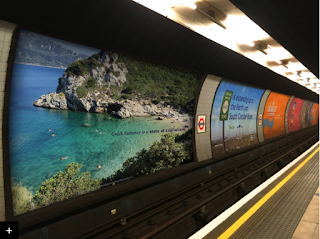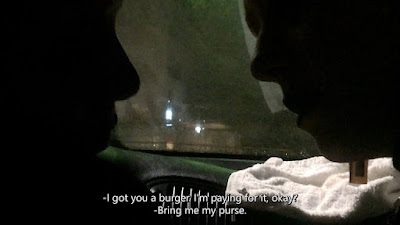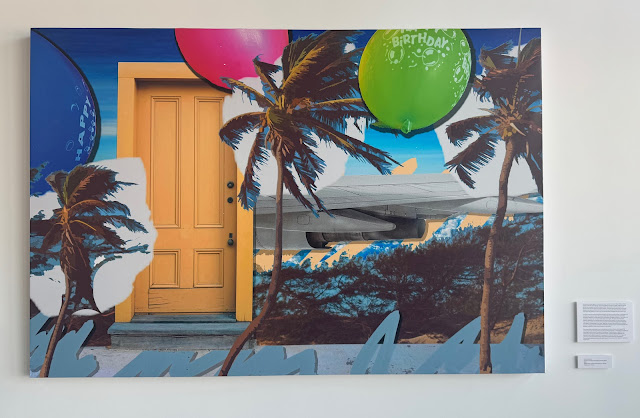Interview with Katerina Mimikou (Dec, 23, 2021 at 09.35.56am)
Interview with Katerina Mimikou (Dec, 23, 2021 at 09.35.56am)
The Greek-London based artist, Katerina Mimikou, sat down with me to talk about her creative practice of collecting images and videos and piecing them together through initiative and subjective aesthetic inclinations. Mimikou talked to me about the positive and negative effects of the pandemic on her work, while offering some insight into her creative problem-solving through artistic practice.
JY: You’re back in Greece, you’ve just finished your degree, you spent half of second year, and all of your third year during the first lockdown?
KM: yes!
JY: how was the first half of your studies compared to the second half?
KM: Very different! Each year was different from one another. COVID made studying very difficult for me. That’s when I came back to Greece and I had no space, I was trying to study with other people who were also working online/remotely. For the third year, the final one, I returned to London. It was a bit better, but I had different expectations for the final year. At some points, I could go to Uni, and other points, I couldn’t. We had a sort of degree show (the Open Studios).
JY: Could you tell me about your practice? what do you make work about? how to you go about making your work? what do you think about when making your work? Do you still make work?
KM: I’ve been making video work and text, mainly, around issues of Feminisms, Gender Identity, Social class, capitalism, and national identity. I like to explore those issues using mainly my personal experience, my family, my friends. My videos are DIY, no fancy cameras. Everything I do is through my phone, which adds a nice quality to the work. The text I use is usually in the Greek Language, but sometimes I use Greek and English text, which is a combination of what is going on in my head. But, also the combination of text is a statement on the English language dominance in art and our lives in generally.
JY: You make still images and video work. Could you tell me about the different process of your work and the theories that underpin making work for you?
KM: The way I make work is the same, regardless of whether it is a text, video, or still image. I go around not having in my mind something specific to film or write about. That is why my phone is very useful. I use it to take films of thing interests me. Or if I see something, I feel something, this can tell a story, or I simply like it. I have a huge archive of video, photographs, and pieces of text that I captured in my everyday life. I let sometime pass then I go back to the things I captured. I combine my ideas as I go over the material. I sit on my laptop and see what I have. I re-watch and observe these things, and then, at some point I want to say something then I try to find a way to say this through the video. For example, I captured the video from my open studios/degree show two years before. It stayed with me, something in the moment of this video. I filmed it in Greece, then coming back to London made me realise what it was about that moment. It was about leaving home, not being home or being to go back home. I use my family and my friends a lot too. So, I added text to let others know what I was thinking about. That’s how I work.
JY: Your work in the exhibition shows an image of an underground station and a superimposed advertisement for a Greek beach holiday that reads ‘Greek summer is a state of capitalism’. Could you tell me more about this work and how it fits in with your practice?
KM: The image of the tube was taken recently. The image of the sea was taken during the lockdown in Greece. The text was also recent. At some point, I combined all those different things together. None of the images were taken with the intention for this final work.
Note: What you mentioned reminds me of the role of collage in postmodern art, from the early 60s onwards, when the artist became a collector of things and assembled all of these signifiers together, which allowed views to read the works in their own way. The views then made their own meaning through their own reading. At the same time, you’re making a critique of capitalism, the state and capital. With Greece, you also have the historical origins of these ideas, as well as the role of tourism in the local economy. For example, when the state restricts travel to Greece, which effects the economy.
JY: Could you say more about the impact of studying and creating your work during the lock down, both in Greece and in London?
KM: I was already making work on my laptop, so my practice didn’t change a lot. It wasn’t like I was making paintings and I couldn’t find space to paint. So, at first, I thought that I didn’t have a problem, but then I realised it took a lot out of me, mentally. I was doing my work on the laptop, studying, reading, talking with people, communication, everything had to be there. It became tiring. I didn’t have the same excitement that I use to when I opened the laptop to make a video. That was the biggest difficulty. But I learned how to do things completely on my own, without the support of good equipment from Uni, teachers, and technicians. In the moment, you say to yourself, ‘I have to make this work now or otherwise I’ll just be sad’. That’s what I learned. How to do things on my own. Independence. I had a taste of what it was like not to be at Uni, while still being at Uni. I know that might not sound good for Chelsea, or UAL, but that’s what happened.
Note: I did a Pg Dip Fine art and MA Fine Art at Chelsea, and its was both a plus and a minus that you had to source so much of your own resources. An element of the course was sourcing resources outside of the university, so you had those resources once you left Uni. However, one can argue that approach was a copout on the university’s part for providing certain resources (or lack of communication and mismanagement of university resources) at the time, but there is definitely a benefit when you don’t have access to the space or resources you need, and you have to find your own. The hard part to outsource is the social experience of meeting tutors (and peers) in a physical space to look at or discuss your work or have your peers or friends to talk to and bounce ideas off of. Or you become a slave to your screen and experience fatigue. You need to have your workspace ergonomically set up as working behind a computer creates physical strains on your eyes, neck, shoulders, back, and mind. You need to take breaks every 15 mins, which is why 8hours behind a computer takes such a physical and mental toll on us.
JY: Based on your experiences inside and outside of the art school, as a practitioner and human being navigating the world, do you have any problem-solving techniques that you use or advice for others?
KM: A good thing that I do…I’ll go really basic here. Don’t think twice. This has really helped me. When you do an application, don’t think twice, just submit it. When you receive the results and they don’t accept you, don’t think twice. The same goes for your work. Do what come out of you and don’t think about if other people will like it. It doesn’t really matter. Some people will like what you do, and some won’t. It’s really important not to over think your work because over thinking leads to doubting your work. I have seen many students doubting their work, and themselves, especially when it comes to applying for things (job, awards, exhibitions, MA programmes). Just enjoy it. Don’t think twice.
JY: What are your biggest concerns personally and professionally?
KM: MY biggest concern throughout Uni and now is how am I going to find a job that sustain me financial through what I do (creative work/practice). It’s one thing to go to Uni and really enjoy doing art. But, once you leave, you have to find a job. It’s not that likely that you’re going to be an artist making money off your art. I found it super stressful at first (leaving University last year). But, you it’s nice because you don’t know what is going to happen and what is going to come to you. You’re free to explore. I felt I have all these options
Note: I’ve reflected a lot on doing BA, MA, PhD degrees in art. It’s a real concern about what to do after you leave an art degree. For the last 15 to 20 years, lots of rhetoric coming from organisations that support the significance of creativity (the arts and cultural sectors) in social, political, and economic terms/rhetoric, problem-solving, connecting economic value to the cultural output, for example making countries more desirable to economic trade based on their cultural output, making countries more desirable for companies to move to. It seems one-sided, those of us who devote any portion of our time to learning about art and making art become stuck in this position of sustaining ourselves and contributing to the creative economy and cultural sectors that benefit our participation. If those of use with advanced degrees in art and design feed into the workforce for the creative industries, and users of cultural institutions, like museums and libraries, make vital economic contributions to the economy, then shouldn’t there be appropriate support in place for placing recent graduates into creative sector roles? IS there police that allows support? A more concrete way to regulate the job market around the arts so people can access it? Why did we enrol on these programmes in the first place?
JY: You mentioned the job of making work, a constant gathering of materials with the intention to do something with it later. It’s a method of collecting material, as part of your process, that can be really satisfying because you’re thinking about the possibilities and building an expansive library to draw from. It’s very exciting.
About Katerina Mimikou
https://katerinamimikou.com/
https://www.instagram.com/meloubaki/?hl=el
https://vimeo.com/katerinamimiko
https://graduateshowcase.arts.ac.uk/staged/projects/preview_227236/cover/?guid=9da569d8-b441-4cbe-a67c-425d170b58da










Comments
Post a Comment